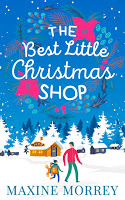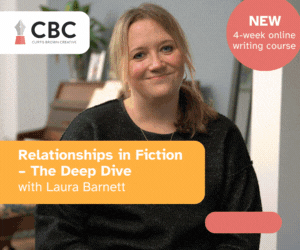Maxine Morrey: Why Romantic Fiction Novels Are Important
24 November 2017

Today we welcome Maxine Morrey to the RNA Blog.
Maxine has wanted to be a writer for as long as she can remember
and wrote her first (very short) book for school when she was ten. Coming in
first, she won a handful of book tokens – perfect for a bookworm!
and wrote her first (very short) book for school when she was ten. Coming in
first, she won a handful of book tokens – perfect for a bookworm!
As time went by, she continued to write, but ‘normal’ work often got in the
way. She has written articles on a variety of subjects, as well as a book on
Brighton for a Local History publisher. However, novels are what she loves
writing the most. After self publishing her first novel when a contract fell
through thanks to the recession, she continued to look for opportunities.
way. She has written articles on a variety of subjects, as well as a book on
Brighton for a Local History publisher. However, novels are what she loves
writing the most. After self publishing her first novel when a contract fell
through thanks to the recession, she continued to look for opportunities.
In August 2015, she won Harper Collins/Carina UK’s ‘Write Christmas’
competition with her romantic comedy, ‘Winter’s Fairytale’.
competition with her romantic comedy, ‘Winter’s Fairytale’.
Maxine lives on the south coast of England, and when not wrangling with words
loves to read sew and listen to podcasts. As she also likes cake she can also
be found either walking or doing something vaguely physical at the gym.
loves to read sew and listen to podcasts. As she also likes cake she can also
be found either walking or doing something vaguely physical at the gym.
You can find out more about Maxine on her website, facebook, or on twitter, instagram and pinterest @ScribblerMaxi.
Over to you Maxine…
A few months ago, there was an article in The Guardian
that alerted us to a new genre of books now proving serious competition for the
incredibly popular ‘grip lit’ and its domination of the book charts. This new
genre is about empathy, kindness and hope. It’s been christened ‘Uplit’.
that alerted us to a new genre of books now proving serious competition for the
incredibly popular ‘grip lit’ and its domination of the book charts. This new
genre is about empathy, kindness and hope. It’s been christened ‘Uplit’.
Except it’s not a new genre at all. Not really. All these
attributes are at the forefront of romantic fiction. The article may have
specifically excluded romance in its description but ask any reader what
romantic fiction means to them and the most common answer is ‘hope’. And in a
dark world, hope is exactly what we need.
attributes are at the forefront of romantic fiction. The article may have
specifically excluded romance in its description but ask any reader what
romantic fiction means to them and the most common answer is ‘hope’. And in a
dark world, hope is exactly what we need.
For years, romantic fiction has taken a bit of a
bashing by those who feel that what we write has no relevance to the world we
live in. Which just goes to show exactly how uninformed these opinions are.
Romantic fiction is entirely relevant to the world, and it has been offering
empathy and hope, love and kindness to its readers for generations.
bashing by those who feel that what we write has no relevance to the world we
live in. Which just goes to show exactly how uninformed these opinions are.
Romantic fiction is entirely relevant to the world, and it has been offering
empathy and hope, love and kindness to its readers for generations.
Romantic fiction is escapism. That’s the point of it.
It’s really the point of novels as a whole. They take us to places. With darker
fiction it may not be a place we want to go. It’s a place we read about and are
thankful not to be there. But romantic fiction is total escapism. We read the
words and are absorbed, drawn into the world created so carefully by the
author, and we want to be there. We feel a connection with the characters,
laughing when they laugh and feeling their pain when hearts are damaged.
Romantic fiction authors work hard to create empathy – the exact thing that the
article claims as a new aspect in fiction. It’s not new. It’s just been
overlooked until now.
It’s really the point of novels as a whole. They take us to places. With darker
fiction it may not be a place we want to go. It’s a place we read about and are
thankful not to be there. But romantic fiction is total escapism. We read the
words and are absorbed, drawn into the world created so carefully by the
author, and we want to be there. We feel a connection with the characters,
laughing when they laugh and feeling their pain when hearts are damaged.
Romantic fiction authors work hard to create empathy – the exact thing that the
article claims as a new aspect in fiction. It’s not new. It’s just been
overlooked until now.
What seems to be so misunderstood is the range that
romantic fiction encompasses. Some books tackle incredibly deep, traumatic
issues whilst others are lighter in tone, but this doesn’t mean they should be
dismissed. We want books that explore things but we also want books that makes
us laugh. Sometimes we want books that do both. And if we look, we will always
find exactly what we’re looking for. The breadth of the genre is expansive.
romantic fiction encompasses. Some books tackle incredibly deep, traumatic
issues whilst others are lighter in tone, but this doesn’t mean they should be
dismissed. We want books that explore things but we also want books that makes
us laugh. Sometimes we want books that do both. And if we look, we will always
find exactly what we’re looking for. The breadth of the genre is expansive.
And the most brilliant things about this genre is something
people always accuse it of with derogation in their tone. They call it predictable. I prefer the term ‘dependable’.
If we have a hero and a heroine, we want them to get together. Yes, they will
need to work for it. There will be conflict and barriers to that love but in
the end, they’ll be together. And that’s exactly what we want. If a reader got
to the end of the novel and the hero or heroine just walked out, the
disappointment for that reader would be immeasurable!
people always accuse it of with derogation in their tone. They call it predictable. I prefer the term ‘dependable’.
If we have a hero and a heroine, we want them to get together. Yes, they will
need to work for it. There will be conflict and barriers to that love but in
the end, they’ll be together. And that’s exactly what we want. If a reader got
to the end of the novel and the hero or heroine just walked out, the
disappointment for that reader would be immeasurable!
People accuse the genre of being predictable like it’s
a bad thing. It’s not. It’s a good thing. It means we can rely on it. We know
these two characters will end up together – the enjoyment comes from seeing how
that’s going to happen. That’s what critics of the genre seem to wilfully
misunderstand.
a bad thing. It’s not. It’s a good thing. It means we can rely on it. We know
these two characters will end up together – the enjoyment comes from seeing how
that’s going to happen. That’s what critics of the genre seem to wilfully
misunderstand.
In today’s world, nothing is reliable. It’s dark, and
unsure and sometimes downright frightening. It’s no wonder people are turning
to books that step away from that with this ‘new’ genre of UpLit. But if they
open their eyes – and more importantly – their minds, they’ll see there’s
nothing new about ‘Uplit’. It’s been here all along.
unsure and sometimes downright frightening. It’s no wonder people are turning
to books that step away from that with this ‘new’ genre of UpLit. But if they
open their eyes – and more importantly – their minds, they’ll see there’s
nothing new about ‘Uplit’. It’s been here all along.
Maxine’s latest book, The Best Little Christmas Shop, is available now.
Home for the holidays…
Icing gingerbread men, arranging handmade toys and making up countless Christmas wreaths in her family’s cosy little Christmas shop isn’t usually globe-trotter Lexi’s idea of fun. But it’s all that’s keeping her mind off romance. And, with a broken engagement under her belt, she’s planning to stay well clear of that for the foreseeable future…until gorgeous single dad Cal Martin walks through the door!
Christmas takes on a whole new meaning as Lexi begins to see it through Cal’s adorable five-year-old son’s eyes. But, finding herself getting dangerously close to the mistletoe with Cal, Lexi knows she needs to back off. She’s sworn off love, and little George needs a stability she can’t provide. One day she’ll decide whether to settle down again – just not yet.
But the best little Christmas shop in this sleepy, snow-covered village has another surprise in store…
Thank you for that Maxine. So what do you think? Is UpLit a new phenomena or romantic fiction by any other name? Why do you think romantic fiction matters?





